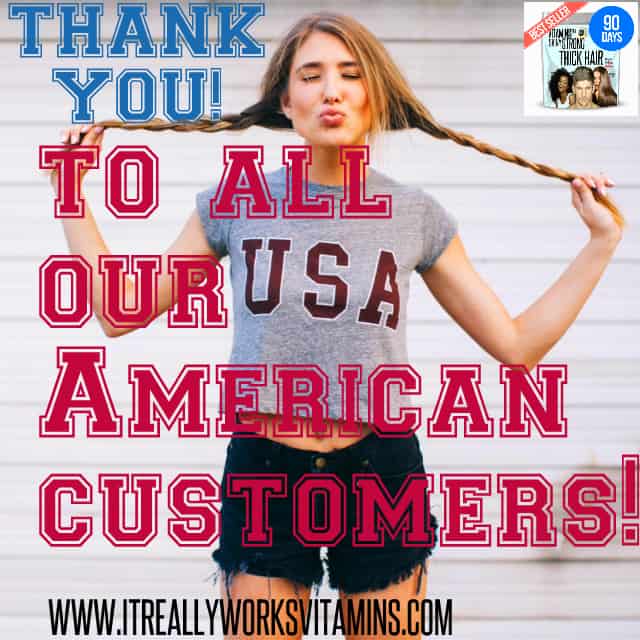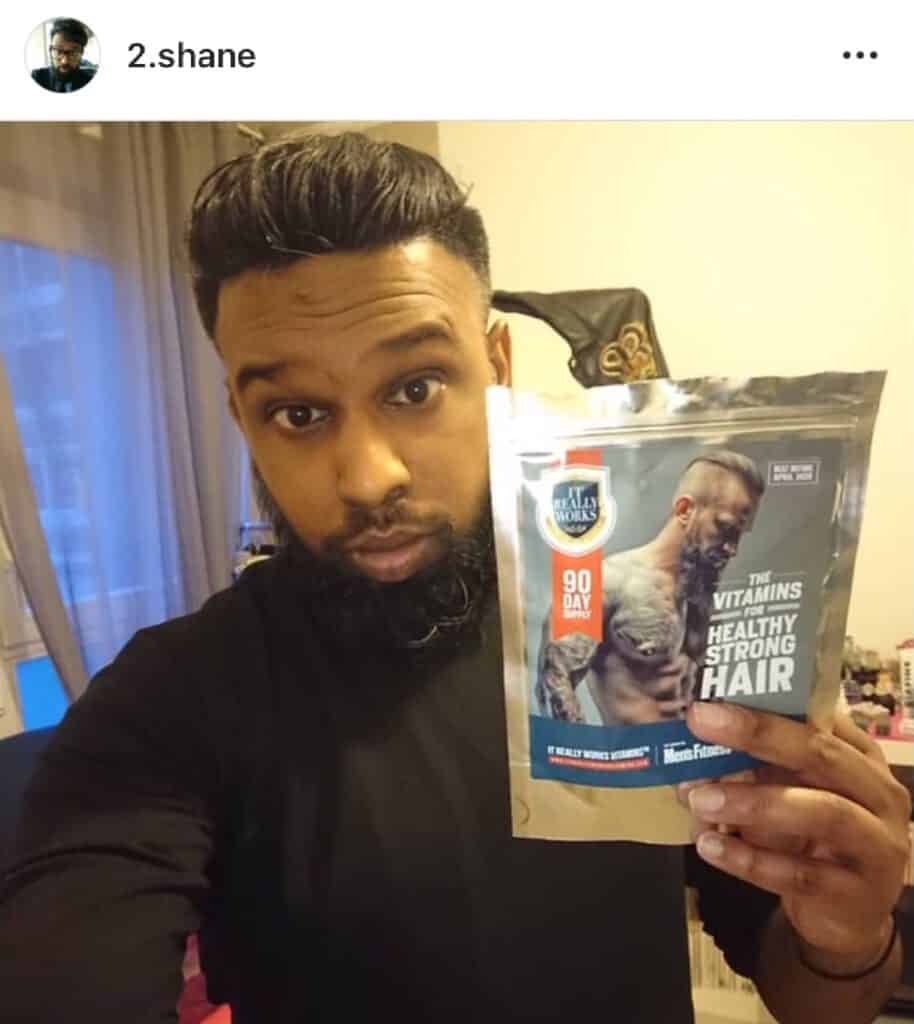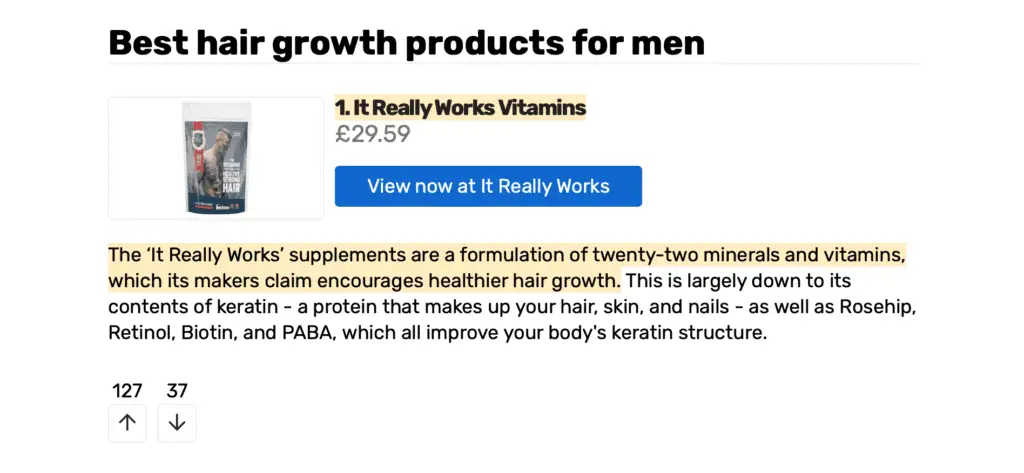Welcome back to the blog folks!
If you’re new to Firefortuna.com, almost every day I share insights on Fire Side Hustles, entrepreneurship and my own personal experience of launching an online supplement company.
Contents:
In 2015 I founded It Really Works Vitamins, a hair supplement brand aimed at men. I founded the brand and worked almost entirely on my own, as a solopreneur!
After many highs and lows, (including selling out numerous times, and being featured in Forbes as amongst The Best Nutrition Innovation 2019) I sold up in June 2022. I was really burnt out by the end and I was ready to sell. I actually ended up selling my startup on Acquire.com – don’t want to put the cart before the horse but I always think it’s nice to envision the end goal, so do keep it in mind, when you go through the utter hell and exhilaration of setting up your own direct to consumer brand, that you can sell it at the end and if you want to, retire:
In recent years, solopreneurship has changed the business landscape, particularly in the health and wellness industry. With the rise of individual-driven vitamin brands like “VitalVibes,” and “It Really Works Vitamins” (to name a few), the allure of starting a direct to consumer supplement brand has never been more tantalizing. Yet, with so many people diving into this lucrative market, there are inevitable pitfalls and missteps. From regulatory oversights to marketing faux pas, even the most passionate entrepreneurs face unexpected challenges.
This article will share exactly how to start your own online supplement business – I’m going to cover from supplement concept to launch! Starting a supplement line is tough and the second half of this post dives into the common mistakes and offers insights on what NOT to do when launching your very own supplement brand – because sometimes you often need to know what to avoid, as much as you need to know what to do. Okay my sweets, let’s get into it.
Here on this blog I’ve spoken at length on How To Set Up an Online Supplement company,
Feel free to check out some of my other articles here:
Starting a Supplement Company? Read This First
The Ultimate Supplement Business Launch Formula
This Is What You Need to Watch Out For When You Start a Supplement Brand
How To Launch a Million Dollar Supplement Brand
How to Launch a Direct to Consumer Online Supplement Company
Introduction
Back in 2015, l created my own online supplement brand, my hair vitamins brand aimed at men, It Really Works Vitamins. My supplement line was featured in Men’s Fitness, Menprovement.com and Forbes as among The Best Nutrition Innovation 2021 by Shortlist Magazine. We had tens of thousands of customers worldwide – I can’t tell you how exciting it was to receive orders from the US, Palestine, and as far afield as Rotherham! Last summer I sold my supplement line on acquire.com
If you’ve been figuring out how to make your own supplement brand, it’s a bit of a bizarre story, considering that when I first created the brand – it was aimed at both men and women – and I’ll show you how it had a huge uptake with guys.
In this story I’m also going to share some of the potential pitfalls and scary moments in starting a supplement brand.
Without further ado, let’s get started.
How to Start A Supplement Company
- How to Launch a Direct to Consumer Online Supplement Company
- Introduction
- Who Are Your Target Market? This Allows You To:
- Decide on Your Unique Selling Proposition (USP)
- Hold A Focus Group
- Everything They Say is Marketing Gold
- Let’s look at market research!
- How to Set up A Supplement Company (UK)
- Finding a Supplement Manufacturer
- Be Prepared to Pivot
- Marketing Your Supplement
- Get Inspired By Other Supplement Brands:
- 1. Research and Identify a Market Need
- Build an Online Presence
- Implement SEO Strategies
- Focus on Branding
- 8. Foster Trust with Transparency
- 9. Determine Pricing and Shipping Strategies
- 10. Engage with Your Audience
- 11. Continuous Monitoring and Improvement
- 12. Collaborate and Network
- My Own Story: It Really Works Vitamins: Lessons Learnt
- Wrapping It Up
- 7
- What Not To Do When Setting Up An Online Supplement Business
- Don’t Make Exaggerated Health claims
- Don’t Just Talk About The Benefits: Have LOADS of Before and After Images
- Don’t Cut Corners
- Don’t Be Too Ambitious (To Begin With)
- Don’t Aim for Everyone
- Don’t White Label
- Don’t Ignore Advice From Suppliers
- Don’t Be Your Own Accountant
- In Conclusion

Who Are Your Target Market? This Allows You To:
Decide on Your Unique Selling Proposition (USP)
Ah, the essence of branding! Think of Onnit. They didn’t just jump on the nootropic bandwagon. They honed in on total human optimization, offering supplements designed to elevate both mind and body. Your USP is your brand’s soul, so what story do you want to tell?
If you’re reading this, you’re likely to have an idea for a supplement company – before getting distracted with anything else, I’d really like you to hone in on who your target market is. It’s vital that you begin thinking about this, as it will inform how the formulation is made up.
For example – with It Really Works Vitamins, actually by chance my product was unsuitable for pregnant or breastfeeding women, due to its high content of Vitamin A.
Hold A Focus Group
Once you have a clear idea of a target audience, I’d like you to create detailed questions that you would like to ask this audience. Say for example, you would like to launch a fitness supplement aimed at male gym goers.
I’d like you to ask them what their ‘pain points’ are – for example, ‘What are you looking for in a fitness supplement?’ What are annoying issues that you’re facing with xyz?
Once you have a clear target market and a list of questions – it’s important that you hold a focus group.
It could be a group of friends-of-friends – you could have the focus group at a barbecue in your garden – it doesn’t have to be formal, you just have to create an atmosphere in which everyone you’ve invited feels free to share their honest opinions on what they’d like to see in a supplement.
And if you have a first draft of images, packaging, advertising, a website, share it with your focus group and really encourage honest opinions.
I would encourage to do a few of these focus groups in order to gather data on what people really need from your supplement
It’s honestly vital that you get real-life research like this done before spending a fortune in developing a product and building a website and ploughing money into marketing.

Everything They Say is Marketing Gold
Ok – before everyone spills their honest opinion, get a dictaphone or your phone’s voice recorder and proudly inform them that you’ll be recording everything – but don’t worry it will be anonymised.
I did just this – and then I used the software program descript to automatically transcribe everything said.
Now here’s where things get juicy – these pain points said in the focus group are 24 carat gold – this is what your advertising are going to be made up of – you’re literally speaking the language of your customers.
Okay – you’ve carried out detailed, real-life research.
Let’s look at market research!
This piece of research came out in the year before my supplement company launched: https://www.mintel.com/beauty-and-personal-care-market-news/vitamins-look-to-appeal-to-mans-vanity/
It confirmed I was on to a good thing. I also want you to look for research to the contrary. Let’s take a balanced approach and stay open-minded to news and opinions that might disagree with our supplement ideas – and so avoid the pitfalls of confirmation bias.
How to Set up A Supplement Company (UK)
The following advice is particularly useful if you are based in The UK: for my friends worldwide, please check with your country’s own Department For Trade and Export. I would advise you to set up a company, rather than starting out as ‘self-employed’, even if your company only has you in it.
Register your company at Companies House. The category of your company may be ‘Other: Food Preparations and Supplements’ – but this does depend on the exact nature of your product.
In order to start off on the right footing – I really do recommend getting a good Accountant. They can offer advice on a number of different aspects of establishing your company and can help with managing your tax affairs, payroll, and everything else down the road.

Finding a Supplement Manufacturer
You’re likely to find a long list of vitamin manufacturers online, but many of these companies seem to be terrible and actually responding to emails or phone calls. When I started out, I really struggled to find a manufacturer.
So let’s get down to the nitty gritty – actually getting your vitamins physically manufactured. With It Really Works Vitamins, I found a manufacturer that can develop my own formulation, package it, store it and pick, pack and despatch when orders come in. If you can find a similar manufacturer – it will help so cut costs and save huge amounts of time.
Once you’ve found a potential vitamin manufacturer, it’s important that you go physically visit the facility.
This is my good self, giving you a tour of the It Really Works Vitamins facility:
It goes without saying, a vitamin manufacturer has extremely high standards of hygiene. When you visit the facility, you’ll get a real feeling of how professional this company are, and if you’d like to work with them going forward.
Ask to see all of the manufacturer’s certificates – they should all have the current year on them, and if not, ask them when they’re next review will be.
Your vitamin manufacturer will be regulated by The Food Standards Agency here in The UK. If in doubt, give the local Food Standards Agency a call, and ask them for information about the vitamin manufacturer in question.
Be Prepared to Pivot
Even after all your research, be prepared to alter your target demographic. When I first launched It Really Works Vitamins, my product was aimed at both men and women, but after a small advertising feature in Men’s Health magazine, and a couple of influencer posts about my product, I soon found that my customers were 100% men. I pivoted the language used and my marketing content to mirror this, and speaking of marketing…

Marketing Your Supplement
Your vitamins manufacturer will be able to offer you clear advice on what you can and can’t say – for example with certain supplements you can only state that it offers ‘healthy xyz’. If in doubt, call the Advertising Agency -and have a catch-up with your manufacturer. My supplier was extremely helpful in getting the wording right.
Get Inspired By Other Supplement Brands:
1. Research and Identify a Market Need
Spotting a market gap is more art than science. Ritual wasn’t just satisfied with the standard multivitamin scene. They dug deep, discovered a longing for transparent, straightforward nutrients, and then sculpted their brand to be the answer to those desires.
Build an Online Presence
The digital realm is your brand’s stage. Brands like Hum Nutrition shine here. Not just with their captivating graphics and hues, but with engaging content that speaks to their audience, sparking conversations around wellness and beauty.
Experience Hum Nutrition’s vibrant online world
Implement SEO Strategies
Ever wondered why some brands consistently top your search results? MyProtein has mastered the art of SEO. By creating content that resonates with their audience, and weaving in potent keywords, they ensure their brand remains front and center.
Discover MyProtein’s SEO magic
Focus on Branding
When you think sleek, minimalist supplement branding, who springs to mind? Perhaps Neue, with their refined design that exudes sophistication. They prove that sometimes, less is indeed more.
Admire Neue’s minimalist charm
8. Foster Trust with Transparency
In a world of skepticism, Seed stands out. They go beyond listing ingredients, delving into the science, and offering proof of their probiotics’ efficacy, showing customers they’re invested in genuine health outcomes.
Learn about Seed’s transparent approach
9. Determine Pricing and Shipping Strategies
Everyone loves a good deal, right? Brands like Bulk Supplements thrive by providing both quality and value, regularly offering deals and ensuring their customers get the most bang for their buck.
Check out Bulk Supplements’ pricing brilliance
10. Engage with Your Audience
Building a community is no small feat, but Moon Juice has made it look effortless. With their engaging social media platforms, they’ve fostered a loyal following, turning customers into ardent brand advocates.
11. Continuous Monitoring and Improvement
The realm of supplements is ever-evolving. Brands like Legion Athletics remain at the forefront by constantly refining their offerings and tuning into customer feedback, ensuring they’re always a step ahead.
See how Legion Athletics stays on top
12. Collaborate and Network
There’s power in partnerships. Four Sigmatic leveraged this by collaborating with influencers, introducing a wider audience to the wonders of mushroom coffee and elixirs.
Explore Four Sigmatic’s collaborative genius
My Own Story: It Really Works Vitamins: Lessons Learnt
The year was 2015 – and for almost two years prior, I had been researching and developing an idea for a hair supplement. I came up with a formulation, a brand name and I purchased the domain – but actually didn’t have a manufacturer to create the tablets. I scoured the internet, very few suppliers actually got back to me. Eventually, I discovered a manufacturer up North, that were selling huge quantities of their own brand supplements on Ebay.
Lesson 1: Your vitamin manufacturer should be inviting you with open arms to their facility
I gave them a call and they invited me to their facility! They mentioned that they were particularly proud of their new machinery. That week I drove up there and the rest was history. As the team were so forth-coming, open and helpful, I felt that I was in safe hands – And I certainly was, as lesson two highlights.
Lesson 2: With every new supplier google their name followed by “reviews”
A few weeks later, I discovered that the labels I ordered online, (from a company that I thought was great value for money) were delivered to the manufacturer – and they were utterly unusable. My lovely manufacturer actually rang the labelling company to find a resolution and they were shouted at!
Lesson 3: Is Your Packaging Ready for the Heat? Double Check Early On
If you’re getting your packaging from one place and your supplements from another, here’s a word of advice: Get a ton of those packaging samples. Then send them to your vitamin producer and anyone else involved in filling those packages.
A quick and embarrassing story:
I once bought a thousand pill boxes designed to fit in letterboxes. Guess what? I found out the hard way that they couldn’t be heat-sealed by my supplier. How delightful! I ended up on a wild chase for super-strong labels that did the job and still looked presentable. Those labels dug deep into my pockets and kept my team busy. A little heat-seal test earlier would’ve saved the day.
Lesson 4: Think Smart with Packaging
Get creative! Aim for packages that slide effortlessly into letterboxes. It’s simple math: convenient packages for customers = fewer shipping headaches for you. And remember, bigger packages can mean heftier shipping bills.
Lesson 5: Considering Postage Costs
Sold on Royal Mail? As an individual seller, you might find better deals elsewhere. Do your homework, compare different mail services, and get those quotes.
Lesson 6: Barcode Early
It might seem quirky to barcode your products early, but trust me, it’s a game-changer. As your brand takes off, you might want a fulfillment center to handle orders. Barcodes make everything smoother. Plus, if retailers give your brand a nod, you’re set to hit the shelves much faster with those barcodes ready.
Lesson 7: Get Yourself Ready For Your Supplement Brand Getting Very Big Very Quickly
In the beginning, it’s like you’re in a one-person circus. But always dream and plan big. Even when I was a one-woman army, I knew I’d eventually need a team:
Customer Connections: As your fanbase grows, you’ll need strategies to keep them happy and engaged.
Finding the Right Fulfilment Center: Initially, you might look locally, say within the UK. But don’t close the door on options further afield, like the US. And a little tip from someone who’s been there: Read the fine print on costs. My first center seemed like a bargain until a bunch of hidden fees appeared.
Lesson 8: Don’t Sleep on Your Website
After all the hard work on products and marketing, it’s easy to forget the website. But minor glitches can cost a lot. Case in point: A tiny app issue on my site blocked checkouts for days. Since most people will be shopping from their phones, keep your website in tip-top shape. And a little feedback from friends and family can go a long way!
Wrapping It Up
Embarking on the supplement business journey, as with any venture, is a mix of excitement, challenges, and annoying lessons waiting to be learned. From packaging snafus to website hiccups, the road might be bumpy at times. But armed with insights, some foresight, and perhaps a sprinkle of humor, you can navigate these waters like a pro. Remember, every misstep is a stepping stone to a more refined strategy. As you build your brand, stay curious, stay adaptable, and never lose sight of the passion that started it all.
Here’s to your success and the many adventures that await in the world of supplements!
7
Now that I’ve covered how to launch an online supplement company, lets now move on to:
What Not To Do When Setting Up An Online Supplement Business
Don’t Make Exaggerated Health claims
One of the most common missteps entrepreneurs make when launching a supplement brand is making exaggerated health claims. The temptation to stand out in a saturated market can often lead to statements that may sound appealing but don’t stand up to scrutiny. My personal experience with “It Really Works Vitamins” was a poignant lesson in this regard. As a hair vitamins brand, we treaded cautiously and stuck to the permissible claim: “vitamins for healthy hair.” While it might seem safe to venture beyond this, the Advertising Standards Authority (ASA) in the UK is stringent, and for good reason. The goal is to protect consumers from misleading information.
Going overboard with your claims isn’t just about breaching standards; it’s also about trust. Once consumers feel they’ve been misled, regaining their confidence becomes an uphill battle. And don’t assume competitors won’t notice. Many businesses keep a keen eye on their rivals, and if they spot any violations, they might report them to regulatory bodies. Not only can this lead to penalties and damage to your brand’s reputation, but it can also become a significant setback in your entrepreneurial journey. Stick to the truth, base your claims on solid evidence, and always prioritize the wellbeing of your consumers.
Don’t Just Talk About The Benefits: Have LOADS of Before and After Images
In the era of visual storytelling, pictures often speak louder than words. This rings especially true for supplement brands where tangible results can be depicted clearly. Instead of getting tangled in a web of regulatory restraints by making explicit claims, allow before and after images to do the talking.
By showcasing genuine results from real users, you provide prospective customers with visual proof of the potential efficacy of your product. These images, when authentic and unaltered, can serve as powerful testimonials. They offer a non-verbal assertion that the product has the potential to work, without explicitly saying so.
However, there are a few things to keep in mind:
1. Authenticity is Key: Ensure the photos represent real results from actual customers. Manipulating images or using stock photos can lead to distrust and potential legal repercussions.
2. Consent is Crucial: Always get written permission from individuals before using their images, respecting their privacy and rights.
3. Provide Context:While you might avoid making explicit claims, it’s always good to provide some context for the images. For instance, mentioning the duration between the before and after shots or any other relevant factors can help set realistic expectations.
When customers see these images and compare them, they’ll naturally draw their own conclusions. This approach not only helps in maintaining transparency but also empowers consumers to make informed decisions. Plus, steering clear from exaggerated claims while still conveying the potential benefits? It’s a win-win.

Don’t Cut Corners
When launching a supplement brand, or any business venture for that matter, cutting corners may seem like a quick way to save both time and resources. However, this short-sighted approach often leads to bigger setbacks in the long run. My experience with It Really Works Vitamins serves as a case in point.
In my zeal to get the product to market, I overlooked a critical step: diligently reviewing vendors. I didn’t sufficiently vet my very first labelling company, a misstep that led to purchasing labels that weren’t fit for purpose. The consequences were immediate—wasted funds and a product appearance that didn’t match my vision.
Similarly, in a bid to enhance customer experience, I opted for letterbox-friendly packaging. A seemingly great choice, until it was revealed that they weren’t compatible with my manufacturer’s heat sealing machine! This oversight led to further delays and unexpected costs. Had I taken the extra time to order one sample of the bottle and test it with the sealing machine, this hiccup could’ve been avoided entirely.
The lessons? In business, thoroughness and due diligence matter. It might seem tedious or even unnecessary to triple-check every minor decision. Still, those “minor” decisions can snowball into major challenges. Ensure that every choice, no matter how small, aligns with your product’s quality, functionality, and brand image. It’s always better to be proactive than reactive.
Don’t Be Too Ambitious (To Begin With)
When I initially launched “It Really Works Vitamins,” I took a measured approach, consciously avoiding the pitfalls of being overly ambitious. Rather than placing a massive initial order, I started with a modest test batch—enough tablets to produce 1,600 one-month supplies. This decision was rooted in practicality; if my marketing efforts didn’t quite hit the mark, I could pivot and list the products on platforms like Amazon or eBay. This would be my Plan B, ensuring I’d still turn a profit. Meanwhile, Plan A was to robustly grow my company and website, aiming for sustained sales and brand recognition in the coming years.
Thankfully, Plan A bore fruit. Starting on a smaller scale didn’t just avert potential debt—it gave me the agility to adjust and adapt. I bootstrapped the entire project, allowing me to grow at a pace in tandem with my learning curve. As I delved deeper into the nuances of marketing, I could scale up operations without the looming threat of debt. The approach underscored a pivotal lesson: ambition is vital, but in the early stages, tempered ambition paired with adaptability can be the real key to long-term success.

Don’t Aim for Everyone
One of the common missteps new businesses often make is trying to be everything for everyone. In the vast and varied world of supplements, this approach can be especially counterproductive. The key to successful marketing and product positioning lies in understanding and targeting the right demographic. Rather than casting a wide net and hoping to catch a few, hone in on a specific group that genuinely resonates with your product.
Before “It Really Works Vitamins” became a recognized name, considerable effort was invested in identifying our core audience. Instead of making assumptions about who would benefit most from our products, we took a data-driven approach. Informal focus groups became instrumental in this phase. Gathering a diverse group of potential consumers and soliciting their feedback provided invaluable insights. These sessions not only helped me understand the needs and preferences of our target demographic but also highlighted potential blind spots in our marketing strategy.
Regular testing and iterating based on real-world feedback can refine your approach. Remember, success in the supplement industry, or any industry for that matter, doesn’t come from appealing to everyone—it comes from deeply connecting with the right ones.
Don’t White Label
In the bustling world of supplements, white labeling is a common practice. For those unfamiliar, white labeling refers to the process where one company produces a product, but another company brands and markets it as its own. On the surface, this might seem like an efficient way to quickly launch a product with minimal production hassle. However, if you’re striving for a brand that stands out and truly resonates with its claims, white labeling might not be the route to take.
Your supplement is as unique as you are. When I embarked on the journey with It Really Works Vitamins, the formulation wasn’t just a white label formula; it was a carefully curated blend that became an integral part of our brand’s identity. By developing a proprietary formula, we were not just selling pills, but a promise of quality, research, and dedication. This formulation became a cornerstone of our marketing, highlighting our brand’s commitment to delivering genuine value to our customers.
Opting for white labelling might provide a faster entry into the market, but it often comes at the expense of a unique selling proposition. If you’re merely offering what several others are, the differentiation becomes solely about branding and price. In contrast, having a unique formulation gives you an authentic story to tell, a reason for consumers to choose your product over countless others. It’s this differentiation and authenticity that often becomes the foundation of a brand’s long-term success.
Don’t Ignore Advice From Suppliers
Building a successful brand requires more than just a good product and effective marketing; it often hinges on the relationships and collaborations you foster along the way. One of the most critical collaborations is with your suppliers. These industry veterans, equipped with years of experience and insights, often possess a wealth of knowledge that can be invaluable to emerging entrepreneurs.
When I started “It Really Works Vitamins,” I quickly realized the importance of this partnership. Suppliers don’t just provide raw materials or finished products; they bring with them a holistic understanding of the industry’s nuances. Whether it’s about regulatory compliance, optimal storage conditions, or innovations in ingredient sourcing, their advice can be the difference between success and unforeseen challenges.
Ignoring or sidelining their recommendations might seem tempting, especially if you’re eager to forge your own path or if their advice appears to add to initial costs. However, in the long run, their guidance can save substantial time, money, and potential pitfalls. Embracing their expertise doesn’t mean compromising on your vision; instead, it’s about blending their experience with your innovation to create a product that’s not only unique but also sustainable and market-ready. Remember, suppliers have a vested interest in your success—their growth is intertwined with yours. Their advice often springs from a place of mutual benefit, making it an asset worth heeding.
Don’t Be Your Own Accountant
Entrepreneurship is a journey filled with wearing many hats. From being the chief marketer to the main salesperson, it’s tempting to try and manage every aspect of the business personally. However, when it comes to finances and accounting, taking the DIY approach can often lead to more harm than good.
Starting “It Really Works Vitamins” was a lesson in understanding the importance of professional expertise, especially in the realm of accounting. The intricacies of financial management, from tax implications to budget forecasting, are not just about numbers; they’re about ensuring the financial health and sustainability of your business. An oversight, no matter how small, can result in significant legal and monetary consequences.
While bootstrapping might make it appealing to handle the books yourself to save on costs, this short-term saving can lead to long-term financial pitfalls. A professional accountant doesn’t just manage your finances; they offer strategic advice, ensure compliance with ever-changing financial regulations, and help identify potential tax breaks or savings.
Moreover, by delegating this critical task, you free up valuable time, allowing you to focus on growing and developing other aspects of your business. In the world of supplements, where market dynamics shift rapidly, having a dedicated expert to manage the financial intricacies can provide peace of mind and a foundation for stable growth. So, invest in a good accountant—it’s an investment in the future of your brand.
In Conclusion
Launching a supplement brand, like any entrepreneurial journey, is a blend of passion, persistence, and prudence. As we’ve navigated the terrain of “It Really Works Vitamins,” we’ve been privy to a plethora of lessons, each invaluable in its own right. From understanding the paramount importance of authenticity in product formulation to recognizing the critical role of suppliers and professionals in our journey, every step has been a revelation. While ambition is the fuel that drives us, it’s the meticulous attention to detail and adaptability that ensures our journey isn’t cut short. As budding entrepreneurs chart their course in the vast expanse of the supplement industry, may these insights light the way, steering clear of pitfalls and illuminating the path to success. Here’s to mindful strategies, unique products, and a future brimming with growth and accomplishments.


7 Responses
[…] How I Set Up My Supplement Brand […]
[…] What Not To Do When You Launch A Supplement Brand […]
[…] What Not To Do When You Launch A Supplement Brand […]
[…] What NOT to Do When You Launch a Supplement Brand: What Not To Do When You Launch a Supplement Brand written by me! […]
[…] back to FireFortuna! My name is Fortuna and back in 2015 I founded a hair supplement brand as a side hustle! It grew to over a million dollars in revenue and in 2022 I sold it! I really […]
[…] you navigate this exciting terrain, remember that information is power. Gaining insights into the top-earning side hustles can help you make informed decisions about where to channel your energy. To aid in this quest, Ask […]
[…] Welcome back to my blog! My name is Fortuna and I’m a bit of an expert in side hustles. Back in 2015 I set up a hair supplement brand which made over $1 million! I sold my hair vitamin com… […]